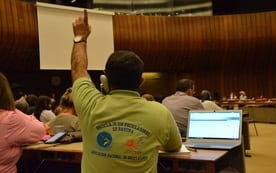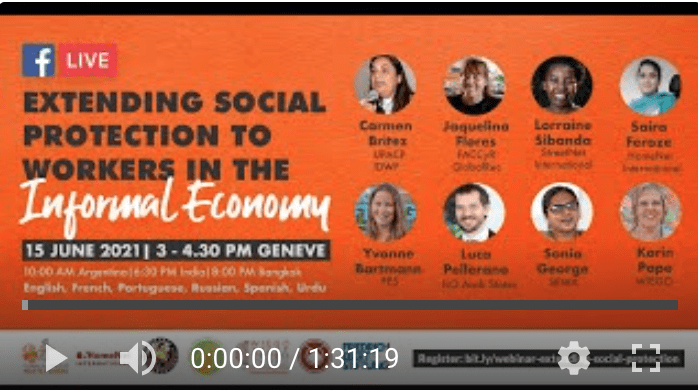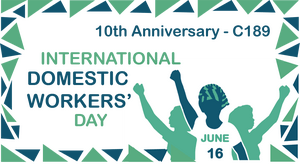Extending Social Protection to Women and Men in the Informal Economy
-
June 3, 2021 - June 19, 2021
-
ILO Headquarters, Geneva
Virtual

Workers take fight for social protection to ILC
Les travailleuse·eur·s emmènent à la CIT leur combat pour la protection sociale
Las personas trabajadoras llevan la lucha por la protección social a la CIT
For the first time in its history, the 109th International Labour Conference (ILC) was held virtually due to restrictions and changes imposed by the COVID-19 pandemic. The items of the ILC agenda this year were divided in two parts. The items on the 3-19 June segment included a special outcome document on the ILO response to COVID-19 and a recurrent discussion on social protection. After the meetings in June, the ILC resumed its work in November.
WIEGO and its Network Partners worked since the onset of the pandemic, across sectors and with a range of people and organizations, to organize affiliates at national and regional levels to call on governments to accelerate investments in worker protections as a central component of economic recovery plans. Yet throughout the year, workers in the informal economy faced limited relief, ongoing exclusion, and continued violence and harassment in many contexts. In response to the gaps in national social protection systems, organizations of workers in the informal economy played a central role in providing relief. Some organizations were involved in social dialogue, implementation and last mile delivery of government social protection programs.
During the ILC two-week sessions, a delegation of workers representing the Global Alliance of Waste Pickers, the International Domestic Workers Federation (IDWF), HomeNet International, SEWA, StreetNet International, and WIEGO participated during the virtual meetings to bring the voices and experiences of the most marginalized workers. Together with IDWF leaders representing national delegations from the Dominican Republic, Namibia, Nicaragua, Philippines and South Africa, the workers representing the informal economy shared with ILO participants the need for recognition and national protection systems based on solidarity in financing and mutual support.
The COVID-19 pandemic underscores, now more than ever, that social justice and economic recovery cannot be achieved until every worker has decent working conditions and the contributions they make to society are understood and recognized. Workers in the informal economy are on the frontlines as domestic workers providing care, home-based workers manufacturing personal protective equipment, street vendors and market traders selling food and basic necessities, and waste pickers keeping cities clean.
Continue reading the Global Networks Position Paper on Extending Social Protection to Women and Men in the Informal Economy, available in: English, Français, Português, русский, and Español
Related: “We moved mountains”: 7 winning strategies that influenced the ILC agenda
Carmen Britez, Vice president of the International Domestic Workers Federation and Representative of the Unión Personal Auxiliar de Casas Particulares (UPACP) of Argentina addresses ILO Plenary during the 109th International Labour Conference
Lorraine Sibanda, President of the Zimbabwe Chamber of Informal Economy Associations (ZCIEA) and StreetNet International, addresses the 109th International Labour Conference Plenary on June 14
Suntaree Saeng-Ging, International Coordinator of HomeNet South East Asia, and representative of HomeNet International and WIEGO, addresses the 109th International Labour Conference Plenary on June 16
Discussion with the Network representatives on COVID-19 and its impact on women workers in the informal economy and how to ensure a recovery that takes into account the need to transition from the informal to the formal economy.
Global Network Representatives:
10 Years of Resilience: A Celebration of the Domestic Workers Convention
 Global Network of Workers in the Informal Economy
Global Network of Workers in the Informal EconomyIn this webinar, leaders representing the informal economy shared experiences and reflections with ILO officials on the need to increase recognition and national protection systems based on solidarity in financing and mutual support.
 10 Years Since Winning Convention 189: Domestic Workers Become an Unstoppable Movement, by Georgia Montague-Nelson and Celia Mather
10 Years Since Winning Convention 189: Domestic Workers Become an Unstoppable Movement, by Georgia Montague-Nelson and Celia Mather
Human Rights Watch, International Domestic Workers Federation, International Trade Union Confederation, and Women in the Informal Employment: Globalizing and Organizing created the video, which recounts how domestic workers, trade unions, and nongovernmental organizations mobilized to win a treaty that guarantees domestic workers equal protections as other workers, while addressing the rights of children and migrants in domestic work.
Annie Diouf, StreetNet International representative addresses the ILC Recurrent Discussion on Social Security Committee, 4 June.
Fish Ip, International Domestic Workers Federation (IDWF) representative addresses the ILC Recurrent Discussion on Social Security Committee, 4 June.
Jacquelina Flores, FACCyR UTEP representative addresses the ILC Recurrent Discussion on Social Security Committee, 4 June.
Kendra Hughes (in Ottawa): +1 613 807-2724; Kendra.Hughes@wiego.org (English, Spanish, French)